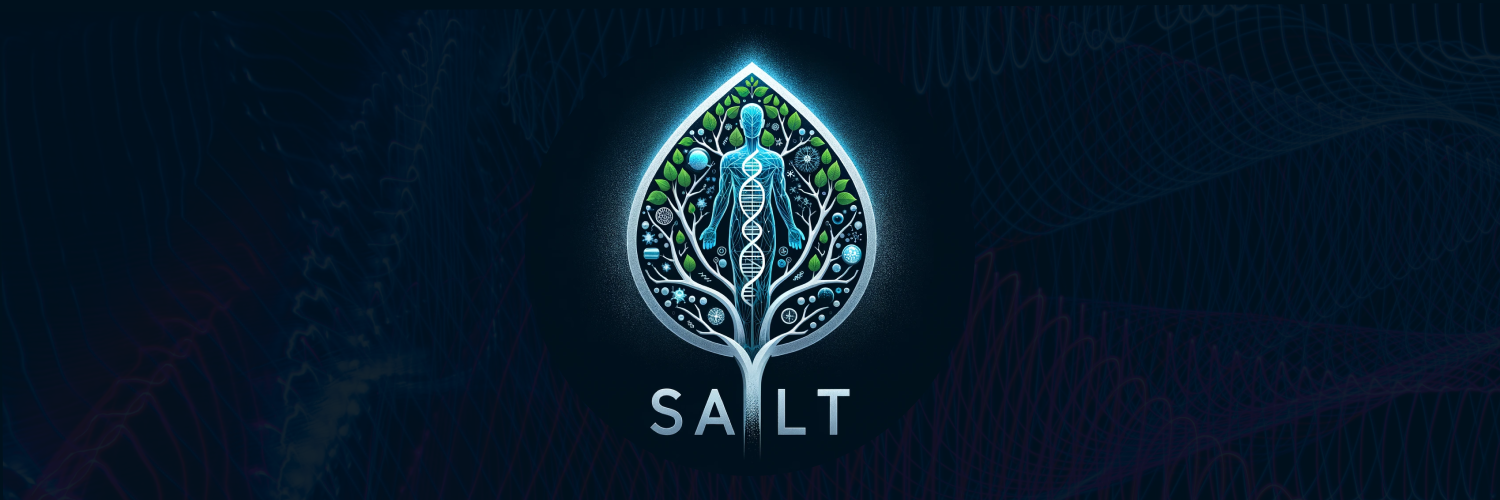UMEssen SALT Save
Softmax for Arbitrary Label Trees (SALT) is a framework for training segmentation networks using conditional probabilities to model hierarchical relationships in the data.
This segmentation framework was developed at the Institute for AI in Medicine of the University Hospital Essen by the SHIP-AI team. The framework can be used for any 2D or 3D segmentation task that exhibits a hierarchical labels structure. In our case, we applied this to medical imaging and provide the segmentation of 145 different structures in the human body.
The model is very fast (average of 35 seconds for a 1000 whole body!) and can segment 113 body regions in a single pass.

Training
Datasets
For training, the dataset folder should have the following structure:
data/
├── lits/
├── kits/
├── saros/
├── ...
Each dataset should contain the following files and folders:
data/
├── saros/
│ ├── labels.txt
| ├── tree-labels.txt
│ ├── train/
│ │ ├── images/
│ │ │ ├── s0001.nii.gz
│ │ │ ├── s0002.nii.gz
│ │ ├── labels/
│ │ │ ├── s0001.nii.gz
│ │ │ ├── s0002.nii.gz
│ ├── val/
│ │ ├── images
│ │ │ ├── ...
│ │ ├── labels
│ │ │ ├── ...
│ ├── test/
│ │ ├── images
│ │ │ ├── ...
│ │ ├── labels
The datasets do not need to have all three train, val, and test folders, and may only include a test set.
The files labels.txt and tree-labels.txt specify the labels from the dataset. labels.txt should contain the label names, while tree-labels.txt should define the hierarchical structure of the labels from the tree. In the labels folder, you can find some examples for these files, and in the conversion you can find examples on how the data was converted to this format.
Train
Once the data is set up, you can build the docker image with
docker build -t shipai/salt .
and then run the container with
docker run -it --rm \
--runtime=nvidia \
--network host \
--user $(id -u):$(id -g) \
--shm-size=8g --ulimit memlock=-1 --ulimit stack=67108864 \
-v /path/to/storage:/storage \
-e NVIDIA_VISIBLE_DEVICES=0,1,2 \
shipai/salt
Once the container is running, you can use the following commands to train the models:
python3 -m salt.train \
--data-dir /storage/datasets/data/ \
--mixed-precision \
--train-dir /storage/models/your-model-name \
--epochs 1000 --batch-size 3 --gpus 0 1 2 --sink-weight 0.0
The number of gpus and the batch size you use depends on how many GPUs you made available in your docker run command.
Once the training is finished, you can export the model to a single model file:
python -m salt.export \
--train-dir /storage/models/your-model-name \
--output-dir /storage/models/exports/your-model-name
Prediction & Evaluation
You can build the docker image with
docker build -t shipai/salt .
and then run the container with
docker run -it --rm \
--runtime=nvidia \
--network host \
--user $(id -u):$(id -g) \
--shm-size=8g --ulimit memlock=-1 --ulimit stack=67108864 \
-v /path/to/storage:/storage \
-e NVIDIA_VISIBLE_DEVICES=0,1,2 \
shipai/salt
Once the container is running, you can compute the predictions for your dataset using our model
python -m salt.predict \
--data-dir /storage/datasets/data/dataset-name/images \
--output_dir /storage/results/your-model-name/dataset-name
or run it with your newly trained model
python -m salt.predict \
--model-file /storage/models/exports/your-model-name/model.pt \
--config-file /storage/models/exports/your-model-name/config.pkl \
--data-dir /storage/datasets/data/dataset-name/images \
--output_dir /storage/results/your-model-name/dataset-name
Note that for the predictions, the data does not need to be in a particular format, and any folder containing NIfTI files can be used as input.
If your dataset has a ground truth, you can evaluate the predictions from outside the container using:
poetry run python -m salt.classic_evaluate \
--config-file /path/to/the/model/config.pkl \
--data-dir /path/to/the/data \
--predictions-dir /path/to/the/predictions \
--output-dir /path/for/results


